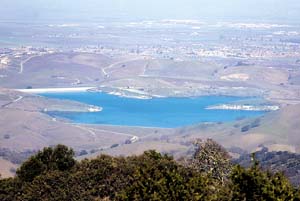The San Benito Water District is looking at several different
ways to kill zebra mussels that have infested the San Justo
Reservoir, and a water official confirmed this week that the
mollusk is isolated there.
The San Benito Water District is looking at several different ways to kill zebra mussels that have infested the San Justo Reservoir, and a water official confirmed this week that the mollusk is isolated there.
The fingernail-size, freshwater mollusk is an invasive species native to southern Russia, which was found in the reservoir in January. The tiny animal causes major damage to water systems by growing inside pipes and clogging them. They have caused billions of dollars in damages across the United States since they were introduced unintentionally in the ballast water of a Russian ship more than 20 years ago.
San Benito County Water District Manager Lance Johnson said he has been looking into several ways of exterminating the mussels and hopes to use “environmentally friendly” tactics to eradicate them this fall. He said the cost to rid San Justo Reservoir of the invasive species could be as low as $250,000 – or as high as $2 million.
He also said divers have found the mussels as far down as 60 feet deep and that the tenacious mollusk can cling to fishing lines, bait buckets, fish, boats and even the bottom of shoes.
“By some miracle they are still isolated in the reservoir,” he said. “We have a hope we can stop them here before they spread to other bodies of water.”
When the mussels were discovered by a fisherman earlier this year, the California Fish and Game Department immediately shut down the reservoir. The fear was that they would hitch a ride on a boat’s hull or other surface and be brought to other lakes or streams.
There known presence at San Justo was the first discovery of the invasive species in California.
B.J. Miller, a Consulting Engineer with the San Luis and Delta-Mendota Water Authority, said many California water systems are “dominated by alien species” and he blamed human activities for damaging the ecosystems. He also said the damage the mussels have caused so far is a fraction of what would happen if they found their way into the Sacramento-San Joaquin Delta, which connects to the San Justo Reservoir.
“The problem is their larvae are very small and float on the water,” Miller said. “If they got into the delta, then they would get carried all over California. It’s potentially such an expensive problem that it justifies setting up inspection stations on all the roads connecting bodies of water where the mussels are found.”










